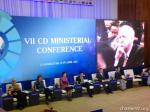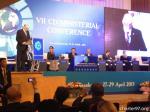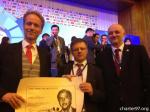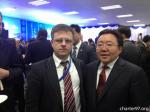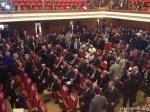Belarusian dictatorship on agenda in Mongolia
16- 2.05.2013, 18:20
The VII Ministerial Conference of the Community of Democracies took place in Mongolia’s capital Ulaanbaatar on 27-29 April.
More than 1200 delegates from 104 countries of the world participated in the conference. Among them there were well-known public figures and politicians: Mongolian president Cahiagiyn Elbegdorj; High Representative of the Union for Foreign Affairs and Security Policy for the European Union Catherine Ashton; chairperson of the Burmese National League for Democracy Aung San Suu Kyi; Swedish Foreign Minister Carl Bildt; prime-minister of Thailand Yingluck Shinawatra; vice-president of Costa-Rica Alfio Piva Mesén; UN Deputy Secretary General Kassym-Zhomart Tokayev; Nobel Peace Prize laureate, human rights activist from Yemen Tawakkol Karman; vice prime minister and foreign minister of Slovakia Miroslav Lajčák; foreign minister of Czech Karel Schwarzenberg; foreign minister of Kyrgyzstan Erlan Abdyldaev; foreign ministers of Indonesia, Salvador, Tunis; executive director of the European Endowment for Democracy Jerzy Pomianowski; president of the Polish Foundation of International Solidarity Krzysztof Stanowski etc.
Lukashenka’s regime is the reason why Belarus is not a member of the Community of Democracies. Nevertheless, the civil society of our country was represented at the Forum by coordinator of the civil campaign European Belarus Uladzimir Kobiets, director of the information office Solidarity with Belarus Yulia Slutskaya and director of the Belarusian House of human rights in Vilnius Ganna Gierasimava.
A range of topics have been discussed at the conference: education for democracy, corruption, “Arab spring”, freedom of press and Internet. Yulia Slutskaya was speaking about the situation with press and Internet in Belarus. She emphasized how crucial the Internet is in Belarus where there is no independent television, and the few independent papers with limited circulations can be shut down at any moment. She mentioned the silent protest rallies of 2011 against the economic crisis, that were coordinated via social media and forums of independent websites.
During the conference, Aung San Suu Kyi received the prize of Bronisław Geremek, and former ambassador of Sweden to Belarus Stefan Eriksson was awarded with the international Mark Palmer Prize for his work in Belarus.
Belarus was the focus of a separate meeting within the conference. The meeting was attended by representatives from Belarus as well as general secretary of the Community of Democracies Maria Leissner, foreign minister of Czech Karel Schwarzenberg, chairperson of the Polish Fund of International Solidarity Krzysztof Stanowski, representatives of the foreign ministries of the members of the Community, diplomats, representatives of international NGOs. The participants of the meeting discussed the situation in Belarus, measures directed at release of the political prisoners and solution to the Belarusian problem in general. Moreover, the Belarusian participants urged the European Union to eliminate visa regime for the Belarusian citizens as soon as possible.
During the conference, the Belarusian representatives have held a range of important meetings with high European officials, heads of states and governments, representatives of international NGOs, civil activists from different countries of the world.
Thus, in a conversation with the coordinator of the civil campaign European Belarus, Mongolian president Cahiagiyn Elbegdorj said that he is well aware of the situation with human rights in Belarus, and expressed his support of the Belarusian fighters for freedom.
High Representative of the Union for Foreign Affairs and Security Policy for the European Union Catherine Ashton shared her opinion concerning the sanctions and the political prisoners with the Belarusians delegates.
“Of course, for me, the Belarusian issue was the most important on the agenda. It is crucial that the states that previously had not taken any interest in our country have joined the discussion around the dictatorship in Belarus. I was talking about the need to keep a firm position regarding the Belarusian regime until the political prisoners are released and rehabilitated. After that, a serious conversation about structural reforms and free elections can begin.
But let me say something about Mongolia. The country situated between Russia and China demonstrates amazing dynamics in different spheres, from democratic rights and freedoms to economy. More than 7000 NGOs operate here, and according to the Freedom House, Mongolia is just one point behind Sweden in terms of rights and freedoms,” Uladzimir Kobiets commented on the results of the conference to charter97.org.




